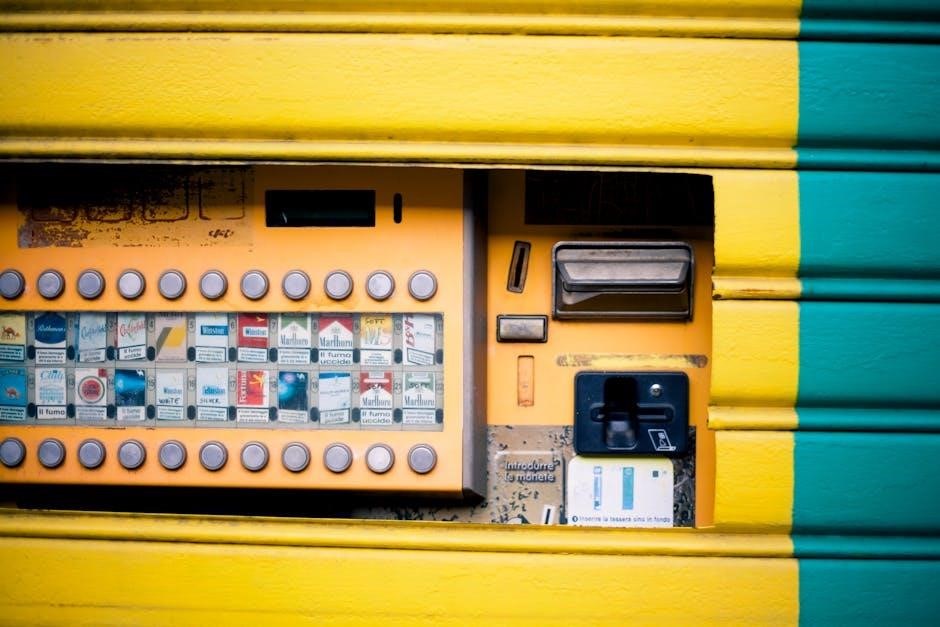A vending machine contract is a legal agreement outlining terms for placing and operating machines on a location․ It ensures clarity, protection, and mutual understanding for all parties involved․
1․1․ Definition and Purpose of a Vending Machine Contract
A vending machine contract is a legally binding agreement between a vendor and a location owner, outlining terms for installing and operating vending machines․ Its purpose is to establish clear responsibilities, payment structures, and operational guidelines․ The contract ensures both parties understand their roles, from machine maintenance to revenue sharing; It also protects interests by addressing potential disputes and termination clauses․ This agreement is essential for ensuring smooth operations and fostering a mutually beneficial partnership․ By defining expectations, it helps avoid conflicts and ensures compliance with legal requirements․
1․2․ Importance of Having a Written Agreement
A written vending machine contract provides legal protection and clarity for both parties; It outlines responsibilities, payment terms, and dispute resolution, reducing misunderstandings․ Having a formal document ensures that all terms are enforceable, protecting the vendor’s investment and the location owner’s rights․ A written agreement also establishes accountability and maintains professionalism․ It serves as a reference point, preventing conflicts and ensuring smooth operations․ Without a written contract, either party may face legal risks or financial losses, making it essential for a secure and successful partnership․

Key Components of a Vending Machine Contract
A comprehensive vending machine contract includes terms like payment structures, equipment ownership, maintenance responsibilities, and duration․ These elements ensure a clear and enforceable agreement for all parties․
2․1․ Parties Involved and Their Responsibilities
A vending machine contract involves two primary parties: the company granting placement and the vendor operating the machines․ The vendor is responsible for installation, maintenance, and restocking, ensuring products meet quality standards․ The company typically provides the location and may agree to exclusivity clauses․ The vendor retains ownership of the machines and profits, while the company monitors compliance with policies and agreements․ Both parties must adhere to the terms outlined, ensuring smooth operation and mutual benefit․
2․2․ Term and Duration of the Agreement
The term and duration of a vending machine contract specify the agreement’s start and end dates․ Contracts typically range from one to five years, renewable upon mutual agreement․ The term includes the initial period and any extensions, ensuring both parties understand their obligations․ Automatic renewal clauses may apply if neither party terminates the agreement before the expiry date․ The contract also outlines notice periods for termination, providing clarity on how to exit or extend the arrangement․ This structure ensures stability and predictability for both the vendor and the location provider․
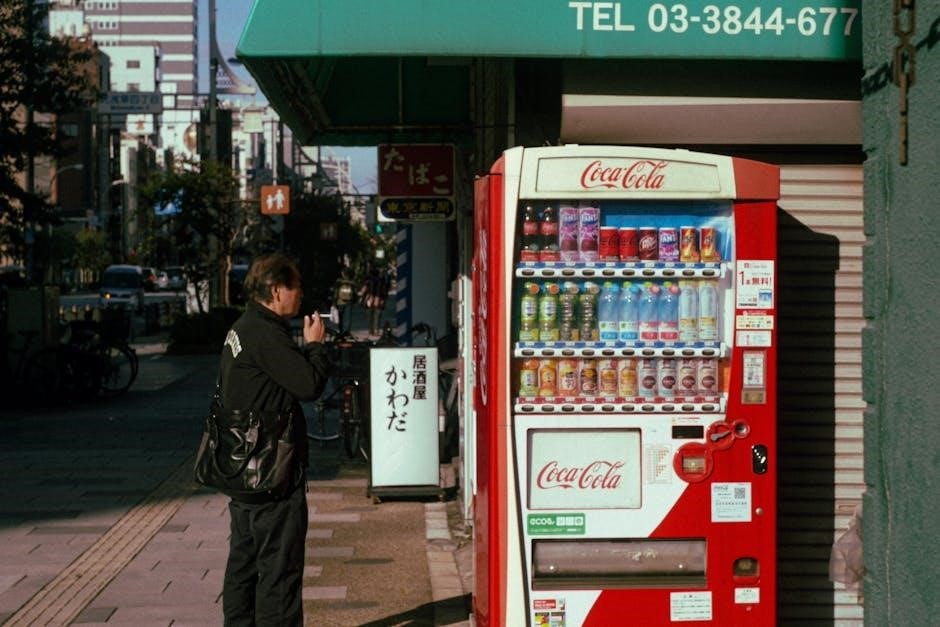
2․3․ Compensation and Payment Terms
Compensation and payment terms outline how revenue is split between the vendor and the location owner․ Common structures include a percentage of sales, fixed rent, or a hybrid model․ Payments are typically monthly or quarterly, based on machine performance․ The agreement specifies calculation methods, payment deadlines, and late fees․ Transparency in revenue reporting ensures accurate compensation․ Some contracts include provisions for adjusting terms if sales fluctuate significantly․ Payment terms must be clear to avoid disputes, ensuring smooth financial transactions throughout the agreement’s duration․ This section is crucial for maintaining a fair and profitable partnership․
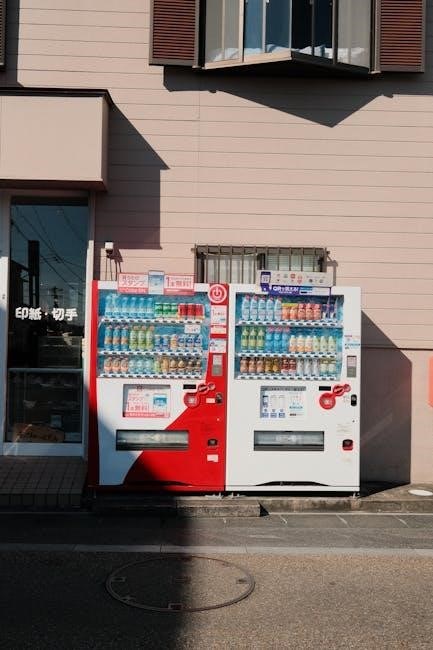
2․4․ Equipment Ownership and Maintenance
Equipment ownership typically remains with the vendor, ensuring they retain control over the vending machines․ The agreement specifies maintenance responsibilities, often falling on the vendor to ensure proper functionality; Regular servicing, repair, and restocking are usually the vendor’s duty․ The location owner may be responsible for providing access and basic utilities․ Any damage caused by the machines must be addressed promptly․ Clear maintenance terms prevent operational disruptions and ensure customer satisfaction․ Ownership and maintenance clauses protect both parties by defining roles and accountability for machine upkeep and performance throughout the contract duration․
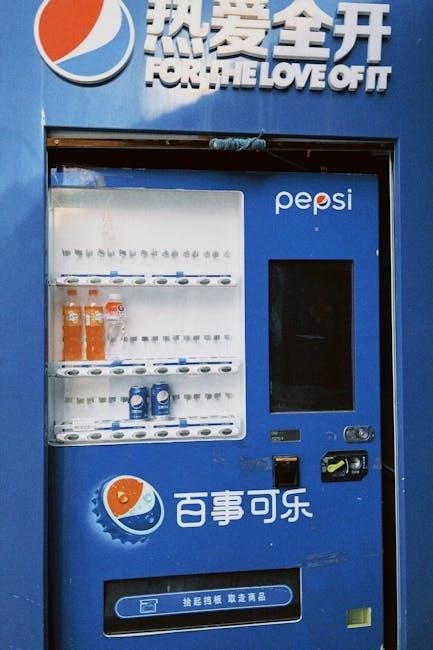
Termination and Renewal Clauses
This section outlines the conditions under which the agreement can be terminated, such as breach of contract or mutual consent, and details renewal terms and procedures․

3․1․ Conditions for Early Termination

Early termination clauses specify scenarios allowing either party to end the agreement before the agreed term․ Common reasons include contract breaches, non-performance, or mutual agreement․ Notice periods are typically outlined, ensuring both parties have time to address issues or prepare for termination․ The contractor usually must remove equipment and repair any damages caused during removal․ These clauses protect both parties by providing clear exit strategies while ensuring responsibilities are met․ Proper documentation is essential to avoid disputes and ensure a smooth transition if termination occurs․
3․2․ Renewal Process and Terms
The renewal process is typically outlined in the contract, requiring mutual agreement and written notice within a specified timeframe․ Terms may include updated commission rates, service expectations, or equipment upgrades․ Both parties must agree to the new terms for renewal to take effect․ If agreed, the contract is extended under the revised conditions․ Renewal ensures continued service without interruption, benefiting both the vendor and the location․ Proper documentation of renewal terms is crucial to maintain clarity and avoid disputes, ensuring a smooth transition into the extended agreement period․
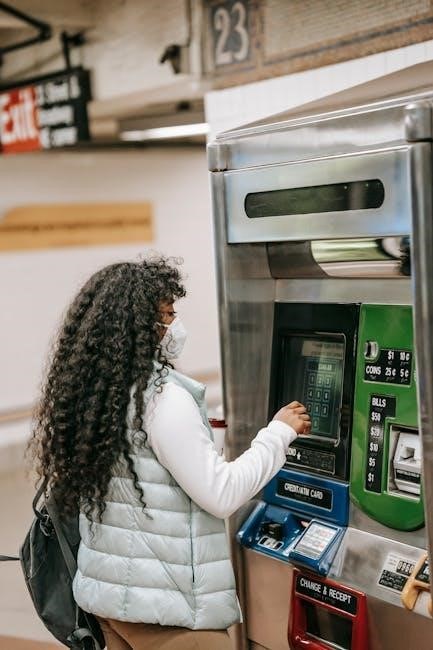
Online Tools for Creating a Vending Machine Contract PDF

Utilize platforms like Adobe Acrobat, Canva, or LegalZoom to create and customize vending machine contracts․ These tools offer templates, editing features, and digital signature options for seamless PDF creation․
4․1․ Templates and Software Recommendations
For creating a vending machine contract PDF, consider using templates from platforms like Adobe Acrobat, Canva, or LegalZoom․ These tools provide customizable templates designed specifically for vending agreements, ensuring clarity and professionalism․ Additionally, software like PandaDoc offers advanced features such as digital signatures and automated contract management․ These options streamline the process, allowing users to easily tailor contracts to their needs while maintaining legal compliance․ By leveraging these resources, you can efficiently generate and finalize a comprehensive vending machine contract․
4․2․ Steps to Customize and Finalize the Agreement
To customize a vending machine contract PDF, start by selecting a suitable template․ Enter the details of all parties involved, such as names, addresses, and contact information; Review and edit the terms, including machine placement, payment terms, and responsibilities․ Use fillable fields to insert specific data like machine types, locations, and commission rates․ Ensure all clauses are clear and tailored to your needs․ After customization, have all parties review the agreement for accuracy․ Finally, sign the document electronically or in person, and save a copy for records․ This ensures the agreement is legally binding and ready for implementation․
Best Practices for Drafting a Vending Machine Contract
Ensure clarity and specificity in contract language to avoid disputes․ Include detailed terms about responsibilities, payments, and termination․ Regular legal reviews are essential to maintain compliance and fairness․
5․1․ Clarity and Specificity in Contract Language
Clear and specific language is essential in a vending machine contract to prevent disputes․ Define all terms, responsibilities, and expectations explicitly․ Avoid vague statements and ensure both parties understand their obligations․ Specify details like payment terms, machine maintenance, and termination conditions․ Ambiguities can lead to legal issues, so precise language is crucial․ Include timelines, compensation structures, and compliance requirements․ This ensures transparency and fairness, protecting both the vendor and the location owner․ Regular legal reviews can help maintain clarity and enforceability․ A well-drafted contract fosters trust and long-term collaboration․
5․2․ Legal Compliance and Consultation
Ensuring legal compliance is critical when drafting a vending machine contract․ The agreement must adhere to local, state, and federal laws, including consumer protection and health regulations․ Consultation with a legal expert is essential to verify that all clauses meet legal standards․ Non-compliance can lead to penalties or contract termination․ Both parties should seek legal advice to understand their rights and obligations․ Regular reviews of the contract ensure ongoing compliance with evolving laws․ This step safeguards against potential disputes and ensures the agreement remains enforceable and fair for all involved․
Finalizing a vending machine contract ensures clarity, compliance, and mutual benefit․ Review the agreement thoroughly, address any concerns, and implement the terms to establish a smooth partnership․
6․1․ Final Review and Signing the Agreement
Before signing, both parties should meticulously review the vending machine contract to ensure all terms align with their understanding․ This includes checking the placement, payment terms, and maintenance responsibilities․ Any ambiguities or discrepancies should be addressed and clarified to prevent future disputes․ Once both parties are satisfied, the agreement should be signed and dated, with copies provided to all involved․ This step ensures legal validity and serves as a formal commitment to the outlined terms․
6․2․ Implementation and Monitoring
After signing, the vending machine contract moves into the implementation phase․ The vendor installs the machines as agreed, ensuring they meet the specified requirements․ Both parties should monitor compliance with the contract terms, including product quality, maintenance schedules, and revenue sharing․ Regular communication and performance reviews help maintain smooth operations and address any issues promptly․ This ongoing monitoring ensures the agreement remains beneficial for both parties and aligns with the initial objectives outlined in the contract․
